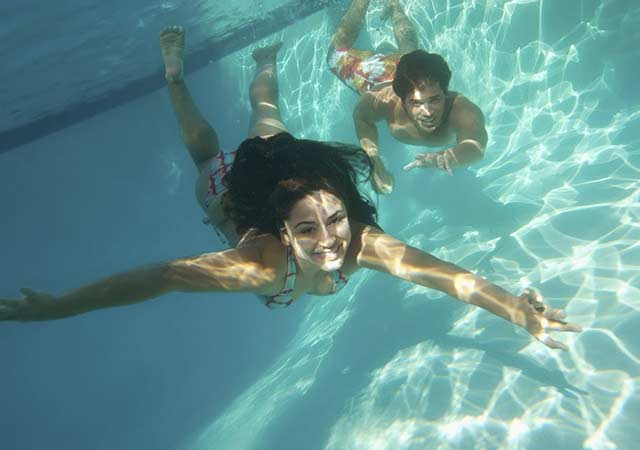When your pool is heated, it doesn’t matter how chilly the temperature is outside. You enjoy warm water and refreshing exercise in the privacy of your own backyard. Here’s what you should know about the three types of pool heaters and how to select the best one for your pool.
Heat-Pump Pool Heaters
Pool heaters that operate using heat pumps don’t use energy to generate heat on their own. A fan draws in exterior air, which then flows over evaporator coils. Coils absorb any heat from the ambient air, and the heat pump’s compressor raises the heat even more to form a hot gas. A condenser then transfers the heat from the gas to the cold pool water cycling through the pump.
Heat-pump pool heaters work most efficiently when the outside air is higher than 45 to 50 degrees Fahrenheit. A heat pump is not the best type of heater if you want to swim in the coldest Seattle months, when temperatures can dip into the 30-degree Fahrenheit range.
You can help your heat-pump heater maintain warm water in the pool by using a solar cover over your pool when it’s not in use. The solar cover helps the pool water retain heat. Avoid leaving the cover in place for long periods of time since water in covered pools can grow algae more easily.
Run your heat pump if the temperature threatens to dip below freezing. The water may not be warm enough for comfortable swimming, but the heat pump will keep the water circulating so it doesn’t freeze. You can add timers and temperature sensors to your pool heating system. Your heat pump will automatically switch on and off to accommodate changing weather and pool conditions.
Solar Pool Heaters
A solar pool heater consists of collectors (solar panels), a pool-water filter, a pump to circulate water, and a flow-control valve. The filter catches any debris in the pool water so the particles don’t contaminate the pump components. Solar collectors may be glazed (glass enclosed) or unglazed depending on your pool-heating needs.
The solar-heated system pumps water to the solar collectors, and the water is heated by circulating through the panels. The water is then returned to the pool to raise the pool-water temperature to a comfortable swimming level. A flow-control valve switches the water to run through the solar collectors as needed.
Solar pool heaters offer low operating costs and longer life spans than heat-pump and gas-fueled pool heaters. However, depending on your location in the Pacific Northwest, there may not be enough solar resources to power a solar pool heater in your pool.
A solar-system installer can evaluate your property to determine if there are enough solar resources to operate a solar pool heater. You’ll need adequate space for the collectors, which must be increased in size in relation to the size of your pool.
If your solar pool heater doesn’t warm the water adequately during the coldest months, you have several options to increase the water temperature. You can augment a solar heater with an auxiliary heat-pump or gas-fired pool heater to increase the temperature of the pool. Or use a pool enclosure or solar cover to keep heat contained in the water.
Gas Pool Heaters
Gas pool heaters are fueled by propane or natural gas. A filter removes foreign matter from the pool water. The clean water is sent to the heater to be warmed by the combustion chamber. Once the water is heated sufficiently, the hot water returns to the pool.
A gas pool heater is a great choice for a pool owner who wants quick results from their pool-heating system. If you use your pool intermittently, a fast-working gas heater is the ideal choice. The gas heater will raise the pool’s water temperature more rapidly than a solar or heat-pump-style pool heater.
Solar-powered and heat-pump pool heaters are limited in the heat they can provide to your pool. However, gas-fired pool heaters can raise your pool’s water temperature as warm as you’d like it. For this reason, a gas-powered pool heater is a great choice when heating a pool for kids and the elderly. Gas-powered pool heaters also allow you to swim comfortably even in the coldest winter months.
Selecting a Pool Heater
Many factors go into determining the best type of heater for your swimming pool. First, you must consider how and when you want to use your pool.
Additional factors that affect which heater is appropriate for your pool include:
- Your preferred water temperature
- The average temperature in the coldest winter month
- The total pool surface area
A qualified pool-heater installer can help you determine the best heater for your pool. After installation, hire an experienced pool professional to maintain your pool heater all year long. Proper care and maintenance extends the life of your pool heater no matter which type of system you have installed.
When you want to swim in your Seattle pool year-round, contact KrisCo Aquatech Pools & Spas, and sign up for a professional pool maintenance plan. We maintain, inspect, and repair your pool equipment to keep your pool warm and comfortable whether it’s summertime or wintertime.


Recent Comments